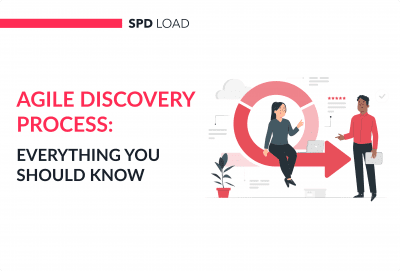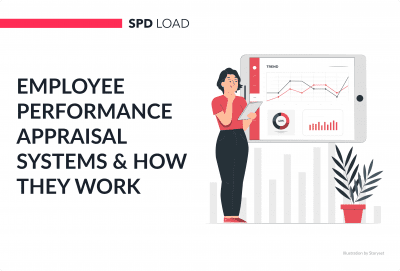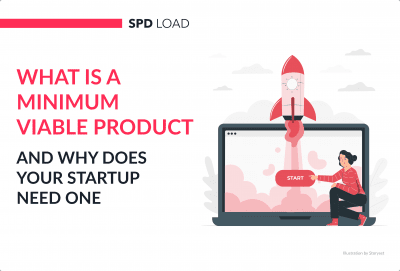Technical Due Diligence: Guide, Examples, and Checklist
- Updated: Aug 27, 2024
- 12 min
Technology due diligence is a critical step for any business looking to secure investment, scale operations, or prepare for acquisition. Whether you’re an early-stage startup or a growing company, it’s one of those things you simply can’t afford to skip, no matter your size or industry.
While it might seem like a tedious formality, due diligence actually gives investors the confidence they need to fund your business. A comprehensive technical due diligence process reveals whether your systems are stable, your product architecture is sound, your code is maintainable, and your intellectual property is protected.
At SpdLoad, we know the technical due diligence drill inside and out. We understand what investors look for, what red flags raise concerns, and what makes a product architecture truly investment-ready. From identifying hidden tech debt to evaluating scalability, we’ve studied the process closely and know how it should be done.
In this article, I’ll walk you through:
- What technical due diligence really means
- Why it matters for startups and investors alike
- What the tech due diligence process looks like from both sides
- Real-life examples of what can go wrong (or right)
- A practical checklist for a thorough technical due diligence
From risk assessment to opportunity identification, our technical due diligence experts have you covered — get started today!
What is Technical Due Diligence?
The technical due diligence process is an analysis and review of the product or service technical specification. It is an obligatory process before investment. Investors use technical due diligence to understand the competency of the product or service.
Here are common technical due diligence questions that help investors understand the state of your business:
- What is the product development stage?
- Is your product or service scalable?
- How competent and credible is the team?
- How accurate are the team’s responsibilities?
- Is the company in a position to execute on its current roadmap?
- What are the weaknesses and strengths of the business model? What risks can it potentially cause?
- Is your company able to meet the requirements?
Knowing these technical aspects will help investors move forward with confidence. Tech due diligence is a must-have item for any company, especially when you choose to outsource MVP development services.
But due diligence is not a one-off task. You need to have tools and teams that work to ensure all the objectives of the analysis are met. It is also important to do due diligence in the early stages of your business. This is because, as the product grows, you will be able to identify ways to scale your project in technical terms. 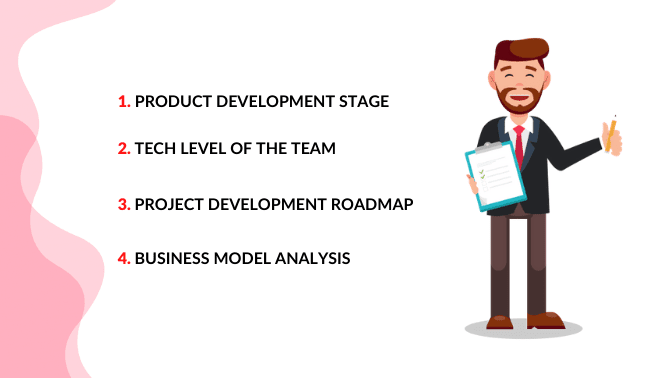
Why Technical Due Diligence Matters
No matter how promising your startup is, it’s hard to convince experienced investors to join without a well-thought-out startup business plan.
A technical due diligence report coupled with a solid plan is a key to attracting business collaborations.
Apart from that, technology due diligence is essential both for you and for the business as an entity.
Here are some of the benefits of having due diligence for your startup:
It proves the seriousness of your business
Startup investors are looking for entrepreneurs who have a plan. They need partners they can work with and businesses that are able to get returns on their investment.
It gives credit to your business
The process of due diligence is supposed to debunk all the myths you have about your business. In short, a due diligence report reveals the actual state of the company.
It helps plan your business
As an entrepreneur, you always need to look ahead. Moreover, you don’t have to do due diligence when investors are lining up to join you. This means that having the report beforehand gives you more chances in front of investors.
Quality assurance eliminates data security risks
Forbes published an article on how compromised data of big firms led to losses and mistrust. Without proper records and analysis, your startup is vulnerable. Breaches that may lead to losses are another reason you need due diligence in place.
| Aspect | for startups | for investors |
|---|---|---|
| Technical viability | Ensures the product is built on a scalable, secure, and maintainable tech stack. | Verifies if the technology can support growth and market demands. |
| Code quality & Architecture | Identifies technical debt, poor coding practices, or flawed architecture early. | Assesses long-term sustainability and cost of future development. |
| Intellectual property (IP) | Confirms ownership of code, patents, and avoids legal risks. | Ensures no IP disputes that could devalue the investment. |
| Scalability | Validates if the infrastructure can handle user growth without major rework. | Evaluates whether the startup can scale efficiently with increased demand. |
| Security & compliance | Prevents breaches, data leaks, and ensures compliance (e.g., GDPR, SOC 2). | Mitigates risks of regulatory fines or reputational damage. |
| Team expertise | Highlights skill gaps in the engineering team that need addressing. | Assesses if the team can execute the technical roadmap. |
| Product roadmap feasibility | Validates if timelines and technical milestones are realistic. | Checks if projected development aligns with business goals. |
| Competitive advantage | Confirms if proprietary tech provides a unique edge over competitors. | Determines if the startup has defensible tech differentiation. |
| Third-party dependencies | Evaluates risks from APIs, vendors, or open-source licenses. | Uncovers hidden costs or vulnerabilities from external tech reliance. |
| Cost efficiency | Optimizes cloud costs, development spend, and infrastructure efficiency. | Ensures capital is used effectively without wasteful tech expenses. |
Technical Due Diligence by Stage
A technology due diligence checklist is key to ensuring that your due diligence report is thorough.
It will also serve as a control manual to ensure that you proceed as planned to meet the objectives.
You might even think of hiring specialists to help you with a technical due diligence process. It’s not an easy venture.
One of the things the due diligence process depends on is the stage of a startup. No matter where you are on the way from zero to hero (or better say, to unicorn startup).
Let’s consider four stages of startups.
Stage #1 – Pre-Seed Stage
This is the earliest stage, right after your product idea is born and early validation begins. You might have a prototype or MVP, but you’re still experimenting and testing the waters.
At this point, technical due diligence focuses on your core idea, team capabilities, and initial architecture choices. Investors want to know:
- Is the product technically feasible?
- Is the tech direction aligned with your long-term vision?
- Does the founding team have the skills (or access to them) to build what’s promised?
Stage #2 – Seed Stage
Now, your MVP is up and running, and you’re getting real user feedback. You’re refining your product and starting to build traction.
Technical due diligence here looks deeper into the product’s architecture and development practices. Questions include:
- Is the codebase clean and maintainable?
- Are there basic security and compliance measures in place?
- Is the infrastructure set up to support early growth?
Stage #3 – Series A
At this stage, your product is in the market and showing signs of real potential. You’re focusing on customer acquisition and preparing to scale.
Technical due diligence becomes more intense. Investors will assess:
- Can the product scale without breaking?
- Are your processes for DevOps, testing, and releases mature enough?
- Is there proper documentation, version control, and team coordination?
Stage #4 – Series B
Your product has a solid user base and established market presence. You’re no longer just a startup, you’re a fast-growing company.
Technical due diligence here covers not just your tech stack, but the entire digital ecosystem you’ve built. Key points include:
- How well is your product integrated with other systems?
- Are there any legacy issues or tech debt that could block future growth?
- Is your security, compliance, and data governance bulletproof?
What does it mean?
The most important element of due diligence depends greatly on the stage of the investment.
For very early stage businesses, there is limited financial and operational information. As a result, understanding the founding team, the market, and any early customer feedback are the most important data points.
For series A companies, hopefully there is data that can prove the company has hit product-market fit. At this stage, investors will be interested in data points such as the stickiness of the product, churn rates, and unit economics.
Finally, for later stage investments, it’s most important to validate the financial performance of the business, how it differentiates against competitors, and the overall market opportunity.
Bruce Hogan, CEO at SoftwarePundit

Your company is expanding, and the chances of finding the right investors are increasing. And more so, they’ll come to you.
It’s an additional reason you need a review of the state of your business. A due diligence checklist can help you convince investors that your business is worth investing in. Even if you’re gonna build a new Uber.
Get a strategic MVP to mitigate risks.
Technical Due Diligence Checklist
Here is the list of several issues for the due diligence checklist.
1. Product & Technology
This stage of technical due diligence covers:
Core technology
- Is the technology proprietary or dependent on third-party solutions?
- Does it provide a competitive advantage?
Tech stack
- Is the stack modern, scalable, and maintainable (e.g., React + Node.js vs. legacy PHP)?
- Are there risks (e.g., deprecated libraries, unsupported frameworks)?
Software architecture
- Monolithic vs. microservices? Is it optimized for future scale?
- Are APIs well-documented and versioned?
Scalability
- Can the system handle 10x–100x traffic spikes?
- Are databases sharded or replicated for performance?
A technical due diligence report is incomplete without legal documents. Thus, you need to file all the legal documents.
No one wants to put their money in a business that has no detailed plan showing growth projections.
As an entrepreneur, you need to make sure that the startup is in a position to grow under any circumstances.
Investors understand that some stages of a startup are not always promising. Besides that, a startup needs to have some space in the market.
Investors will use your scalability projections to calculate the ROI for their investment.
2. Code Quality & Development
Answer the following questions:
Code review
- Is the codebase clean, modular, and documented?
- Are there high levels of technical debt?
Version control & collaboration
- Is Git (or equivalent) used effectively with branching strategies?
- How often are code reviews conducted?
Testing
- Unit, integration, and end-to-end test coverage (%)?
- Are there automated regression tests?
DevOps & CI/CD
- Are deployments automated (e.g., Jenkins, GitHub Actions)?
- Is there a rollback strategy for failed deployments?
3. Infrastructure & Security
Evaluate the following aspects:
Cloud/on-premise infrastructure
- AWS/GCP/Azure? Are costs optimized (e.g., reserved instances, auto-scaling)?
- Is there a single point of failure (SPOF)?
Security
- Has a penetration test been performed?
- Are vulnerabilities patched regularly?
- Is data encrypted in transit and at rest?
Regulatory compliance
- GDPR, HIPAA, SOC 2, or other certifications needed?
- Are audit logs maintained?
4. Data & Analytics
At this stage, it is important to conduct an in-depth analysis of:
Database design
- SQL vs. NoSQL? Is the schema efficient?
- Are backups automated and tested?
Data pipeline
- How is data collected, processed, and stored (ETL processes)?
- Is there a data warehouse (e.g., Snowflake, BigQuery)?
Analytics
- Are key metrics (DAU, churn, etc.) tracked accurately?
5. Team & Processes
Explore the team structure and internal processes of the target company:
Development team
- Skills match the tech stack? Is there a talent gap?
- What’s the turnover rate?
Product roadmap
- Are technical milestones realistic?
- How is technical debt prioritized?
Incident management
- Is there an on-call rotation for outages?
- Mean Time to Resolution (MTTR) for critical bugs?
Intellectual property refers to intangible products as a basis for human knowledge. Software is a great example.
Most technological startups are intellectual products. For you to claim a product or service, you need legal documents that certify the ownership.
Experienced entrepreneurs will ask for documentation certifying your ideas’ originality and operational permit. This is what forms the patent and copyrights for the startup.
In your tech due diligence report, you will need to include all the legal and updated documents that confirm your property ownership.
For example, Tinder has patented swiping and double-opt-in matches, so you can do it for your app too. Or try to build an app like Tinder in a better way. 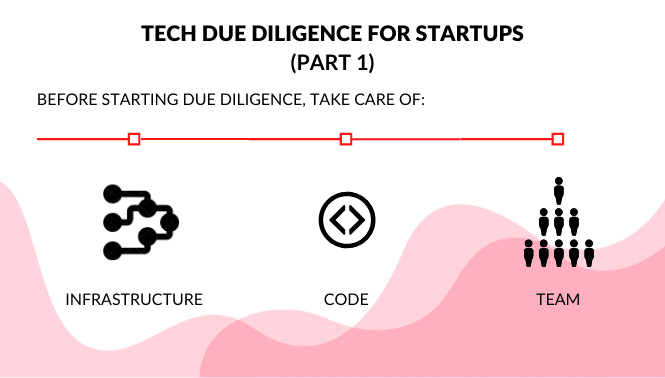
6. Intellectual Property (IP) & Legal
Work with legal advisors to better understand:
Ownership
- Is all code owned by the company (no contractor/licensing risks)?
Open-source risks
- Are there GPL/licensing conflicts in dependencies?
Patents & trademarks
- Are core technologies patented?
There is maintainable code and scalable code. The maintainability of the code refers to the good quality of the code.
In case the code is not maintainable, it will be rather hard to modify it. It means there is a high chain reaction of breakages that can start.
That is why it’s better to hire dedicated developers who do not rely on open-source code and software. Instead, get experts who develop products from scratch.
7. Third-party risks
Evaluate third-party risks:
Vendor lock-in
- Dependency on specific SaaS tools (e.g., Firebase, Twilio)?
API Risks
- Reliance on external APIs? What’s the fallback plan if they fail?
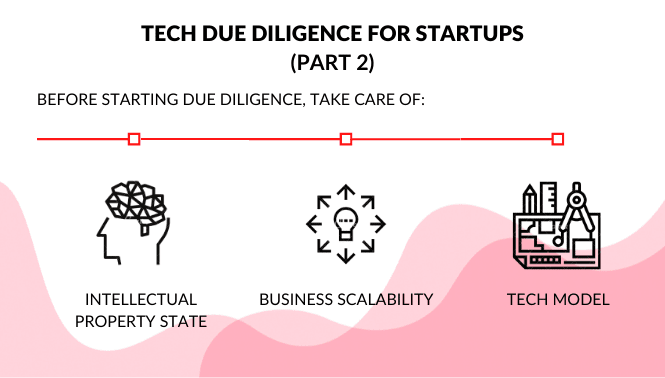
Tech Due Diligence Process Step-by-Step
The technical due diligence process can vary depending on a product’s complexity, the maturity of the startup, and the goals of the investors. But regardless of the industry or stage, most due diligence flows through a few common steps.
Here’s a breakdown of what each phase typically involves and what’s expected of you as a founder.
Get Ready For Cooperation
Before the process begins, the startup founder should be fully prepared to engage in open, transparent discussions. This step is more about mindset than documents. Investors need to feel that you’re cooperative, confident in your tech, and willing to disclose both strengths and weaknesses.
Example: If your backend architecture still relies on a legacy system, be upfront about it. Hiding or sugar-coating details can erode trust early on.
At this point, internal alignment is also crucial. Your tech lead, legal advisor, and product owner should be looped in and aligned on what will be shared and how.
Starting an Official Process
Once there’s verbal agreement to move forward, the due diligence process begins officially. This means you’ll need to gather and submit documentation within a set timeframe, typically ranging from one to three weeks.
Common investor requests include:
- API documentation
- Architecture diagrams
- Codebase overview (sometimes with access)
- Deployment processes
- DevOps and CI/CD pipeline description
- Security protocols and data handling policies
Example: If your platform uses a third-party payment service like Stripe, provide documentation on how it’s integrated and what security layers protect customer data.
This step requires full transparency. If documentation is incomplete or inconsistent, it can raise red flags about your team’s technical maturity.
Referral Procedure
With documents in place, you formally pass everything to the investor or their technical representatives for review.
This phase often includes:
- Access to a data room or shared repository
- Q&A around specific documents
- Requests for clarification or supporting materials
If your CI/CD pipeline claims “automated testing,” investors might ask for test coverage reports or actual test run logs.
Be ready to answer questions asynchronously while they explore your system, and anticipate follow-up requests for more technical details.
Getting Down to Business
This is where face-to-face or video meetings happen. Investors, often supported by technical advisors and due diligence teams, will want to verify what’s on paper and dig deeper into real-world scenarios.
You’ll be asked about:
- How your tech team operates
- How do you manage releases and handle bugs
- How do you plan to scale the architecture
- How do you track metrics like uptime or latency
There may be several rounds of meetings, with both technical and business questions discussed. This is your chance to show that your team can handle complexity, pressure, and growth.
Final Report
After all meetings and document reviews are complete, the investor or an independent tech consultant compiles a final report.
This report typically includes:
- Overview of the product architecture and code quality
- Assessment of scalability and maintainability
- Identification of risks (e.g., tech debt, security vulnerabilities)
- Suggestions for improvement
- Recommendation on investment or deal terms
A report might flag that your system is built using outdated frameworks, suggesting a tech overhaul post-funding. Or it might highlight that your infrastructure is solid, making the product “ready to scale.”
This report plays a big role in the investor’s decision-making. A clean, well-organized, and forward-looking tech foundation can significantly boost your credibility and valuation. 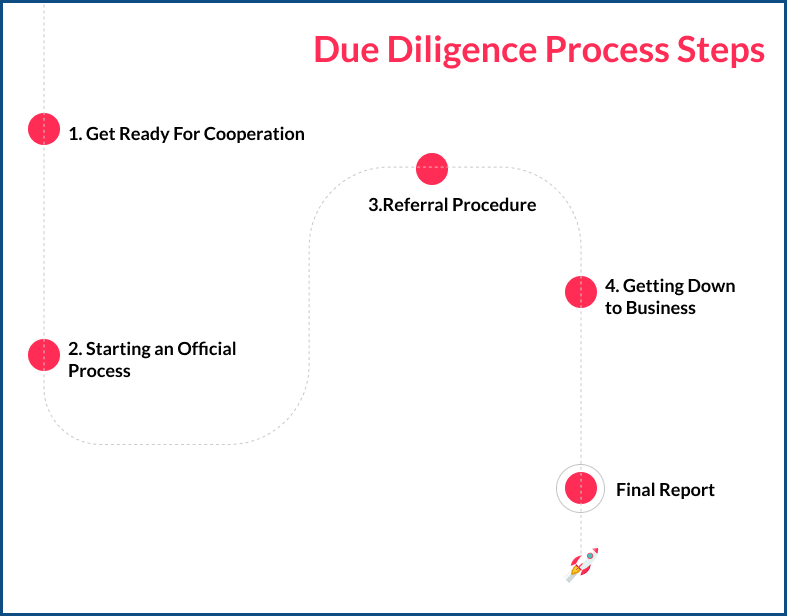
What’s Next?
We’ve covered how essential technical due diligence is for startup success. But identifying gaps is just step one.
The real opportunity lies in having an experienced dev team fill those gaps by building a bulletproof MVP.
That’s exactly what we offer – end-to-end product design tailored to launch startups built to scale. At SpdLoad, we build scalable MVPs that align with your long-term business strategy. From product design to launch, we’re here to help you create a solid foundation for growth.
Have a promising idea? Let’s turn it into a prototype you can build a business on. Get in touch.







